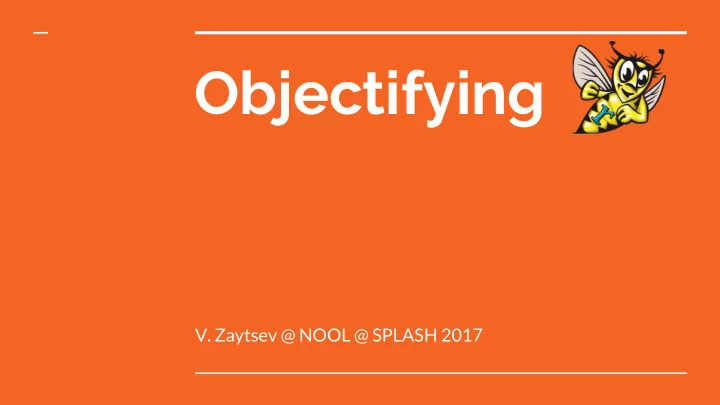

Objectifying V. Zaytsev @ NOOL @ SPLASH 2017
Rascal intro made at CWI, Amsterdam [same team as ASF+SDF] ● one-stop shop by Klint, Vinju and van der Storm ● ● see [SCAM’09] [GTTSE’09] [SLE’11] [SCP 2015] ● Java-like concrete syntax Haskell-like expressions ● GLL-like parsing ● ● grammars and ADTs ● patterns for metaprogramming no OO at all (originally planned, decided otherwise) ●
Language Design & Composition the two were never friends ● For design, wait for SPLASH-I (or the posters) ● ○ cf. DYOL @ MoDELS’17, http://slebok.github.io/dyol Largely unsolved questions: ● ○ how to add OO to FP? is it easier to make an imperative language functional or procedural? ○ ○ how to add queries to a 3GL? ● This exercise: add OO to a metaprogramming language ○
Rascal expressions 1 + 2 sqrt(3*3 + 4*4) [size(s) | list[int] s <- ss] {n*n | n <- [-10..10]}
Rascal grammars syntax CSV = {Value ","}+; lexical Value = [a-zA-Z]+ !>> [a-zA-Z]; layout L = [\ \n \r \t]* !>> [\ \n \r \t];
Rascal functions void push(int x, list[int] xs) { xs += x; } int peek(list[int] xs) = xs[size(xs)-1];
Rascal algebraic data types data Bool = tt() | ff() | conj(Bool L, Bool R) | disj(Bool L, Bool R) ; conj(tt(), disj(tt(), ff()))
Rascal patterns visit(T) { case tt(): counter += 1; } visit(T) { case tt() => ff(); }
Do you have a moment to talk about parsing?
Parsing is a binding parsing is not a grammar ● ● parsing is a process parsing is a mapping ● ● grammar is a double spec
OO is rich clusters ● classes ● ● objects ● prototypes traits ● mixins ● ● enumerations ● records variants ●
BOOL bindings BOOL Foo := plus[word] ~ list[str] syntax CFoo = BoolWord+ boolword; alias AFoo = list[str]; AFoo implodeFoo(CFoo T) = ["<element>" | BoolWord element ← T.boolword]; AFoo bindFoo(str input) = implodeFoo(parse(#CFoo, input));
BOOL classes BOOL Point := seq[int x, comma, int y] ~ class[int x, int y, method add, method sub] Point.add := fun[Point l, Point r] ~ Point[x:=l.x+r.x; y:=l.y+r.y] Point.sub := fun[Point l, Point r] ~ Point[x:=l.x-r.x; y:=l.y-r.y] data APoint = newPoint(int x, int y, APoint(APoint l, APoint r) add, APoint(APoint l, APoint r) sub); APoint addPoint(APoint l, APoint r) = newPoint(l.x+y.x, l.y+r.y, l.add, l.sub);
BOOL records BOOL Pair := seq[int x, comma, int y] ~ record[int x, int y] syntax CPair = BoolInt x "," BoolInt y; alias APair = tuple[int x, int y]; APair newPair(int x, int y) = < x, y >; alias IPair = tuple[CPair(str) parse, APair(str) bind, APair(CPair) implode, APair(int, int) new]; IPair Pair = ...
BOOL clusters BOOL Point := Pair ~ cluster[method add, method sub] Point.add := fun[Pair l, Pair r] ~ Pair[x:=l.x+r.x; y:=l.y+r.y] Point.sub := fun[Pair l, Pair r] ~ Pair[x:=l.x-r.x; y:=l.y-r.y] alias IPoint = tuple[APair(APair, APair) add, APair(APair, APair) sub]; public IPoint Point = < APair (APair l, APair r) { return newPair(l.x+r.x, l.y+r.y);}, APair (APair l, APair r) { return newPair(l.x-r.x, l.y-r.y);} >;
Using BOOL BOOL Pair := seq[int x, comma, int y] ~ record[int x, int y] Point := Pair ~ cluster[method add, method sub] CPair a = Pair.parse("2,3"); APair b = Pair.new(2,3); APair c = Pair.bind("2,3"); c.x = 42; APair d = Point.add(b,c);
BOOL Concluding remarks Tuple-based records & clusters work better than ● ADT-based classes ● A decent alternative is to use closures True bidirectionality is hard in Rascal ● Bindings can form a solid algebra/category ● ongoing work ○ ● OO checklist inheritance: between clusters ○ encapsulation: none; no easy way to hide private parts ○ polymorphism: lost; existed in Rascal on function level ○
Recommend
More recommend